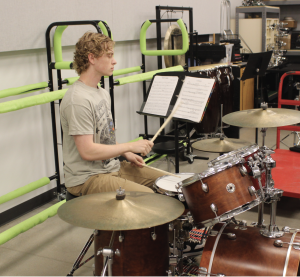Portugal to the U.S.
November 20, 2018
Juniors Julia Provenzi and Paloma Di Ciero talk under their breath, laughing to themselves. No one can tell that they’re really speaking a completely different language.
Since Di Ciero moved to the U.S this year, she befriended a student at Bowie who could understand her in a way that others couldn’t – Julia Provenzi. The peers and friends talk in Portuguese at school every day after meeting in Physics class.
“We’ve become close friends so I translate for her pretty often in class, lunch, and fit,” Provenzi said.
Provenzi and Di Ciero don’t spend all of their time together at school though.
“No she doesn’t [go to all my classes with me], we are just friends,” Di Ciero said.
Provenzi had a strong background in Portuguese before meeting Di Ciero.
“I was actually born in Brazil and then I moved to the United States when I was younger,” Provenzi said. “I’ve lived here for about 10 years, and I still talk in Portuguese with my family.”
Foreign exchange students are thrown into a new environment, and spend all their time learning language and culture.
“Sometimes it is difficult to understand the teachers and students here,” Di Ciero said.
Di Ciero has opened up a different side to Provenzi that most don’t know about.
“This has honestly just made [my life] better because now I can actually talk to another friend [who speaks my language],” Provenzi said.
Provenzi has helped Di Ciero’s transition to Bowie flow seamlessly.
“The most rewarding part would have to be the friendship we have, because of us come from the same culture and background,” Provenzi said.
Di Ciero has lived in the U.S. for two months.
“She has become my friend and helped me understand the culture”
Bowie does not currently have a Portuguese program.
“There isn’t a Portuguese program at Bowie, but I think it’s a pretty fun language,” Provenzi said. “It’s harder to learn than Spanish though so we might not have one since it’s so challenging.”
Since Bowie’s population is around 3,000 kids, it is difficult for exchange students to transition.
“It was hard to transition from a small school to a big school,” Di Ciero said.
Schools in Brazil are drastically different from ones in the U.S.
“Usually, the good [schools] in Brazil are private and they don’t switch classes throughout the day,” Provenzi said. “College is free, but you have to take a big test to get in.”
The students’ friendship is not common for foreign exchange students.
“This isn’t a very common occurrence for foreign exchange students because they’re really not supposed to talk in their language, but we have a lot of Spanish speaking students that do it anyway,” Provenzi said.
There are some parts that challenge Provenzi’s abilities.
“The most difficult part about it is that there’s some slang that I don’t know,” Provenzi said.
Bowie is full of foreign exchange students who come from countries all over the world.
“I think that the foreign exchange students have brought a bunch of different cultures and backgrounds to Bowie,” Provenzi said. “It’s really opened a lot of people’s eyes to different parts of the world.”
Provenzi and Di Ciero became friends quite quickly.
“The easiest part is just talking to each other and having good conversations,” Provenzi said.
Provenzi thinks that the U.S has a different mindset compared to other countries when it comes to language.
“I feel like we [Americans] are so stuck on English and we’re not really open to talking in different languages and the people in different languages,” Provenzi said.
Bowie could possibly benefit from more exposure to other cultures.
“Most countries actually speak more than one language,” Provenzi said. “I feel like we’re just closed off to it and if we spoke more than one language, then we’d have so many more opportunities.”







